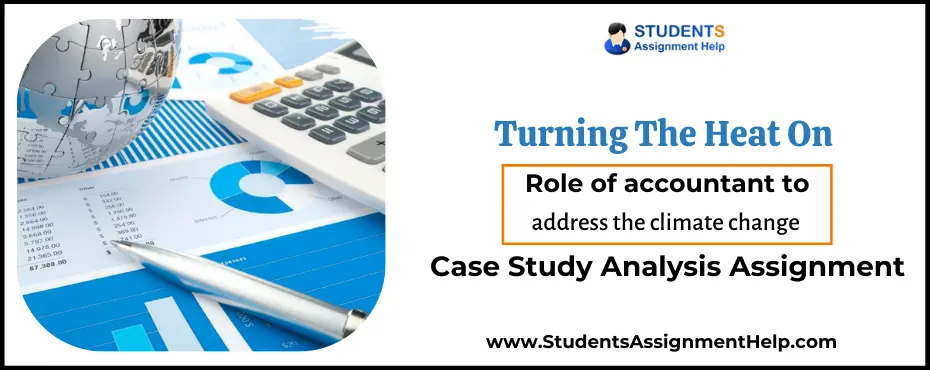Turning The Heat On: Role of accountant to address the climate change Case Study Analysis Assignment

Question Images: Find below the case images from the book. The solution is an answer to question 3 of the Case Study Analysis Assignment.
Accounting Theory and Accountability – Case Study Analysis
Answer 3: Role of an accountant to address climate change (Case Study Analysis Question 3)
Accountants have the technical skills and enough knowledge to address climate change topics. For accountants, it is important to implement government carbon reduction schemes to reduce carbon footprints in the organizations. It is needed for accountants to take the leadership role in developing international climate change mitigation policies. They have enough experience to measure, report and validate mechanisms that are important for credible action on climate change (ACCA, 2014). Accountants must use their knowledge to make a positive contribution to the development of credible policy and agreements related to carbon emissions and climate change.
The accountants have an important role in providing actions to reduce or control emissions that contribute to climate change. Along with this, they develop new knowledge and mechanisms to fulfill new demands and reshape the educational requirements to develop confidence and trust in this profession. Along with this, accountants play an important role in addressing the climate change issues and in the organization. They are doing auditing and ensuring climate performance of companies and evaluating the methods through which companies can mitigate risks of climate change (Idowu and Louche, 2011).
Flexible Rates Compatible With Everyone’s Budget
Hire a Professional Essay & Assignment Writer for completing your Academic Assessments
In this context, the carbon tax is one example in that accountants have to develop a new approach and new skill set. It requires thinking beyond the boundaries of engineering, law, economics and natural science to address the broad issues that are facing business and society (Jones and Ratnatunga, 2012). The carbon tax means that the accountants need to understand the physical measures of carbon and carbon equivalent outputs from different processes and inputs to industrial processes such as energy sources, furnaces, and product based carbon footprints and released of carbon that affect the customers and clients when the end product reach to them.
Carbon trading schemes require more explicit measurement by accountants to show the impact of new financial value for carbon. At the same time, it is found that most companies don’t estimate the carbon pricing implications of business decisions (Hopwood, Unerman & Fries, 2010). For example, the current carbon reduction scheme of Australia includes trading emission in which businesses concerns about profit from the scheme rather than taking actions to reduce carbon footprints. So, it is important for accountants to understand the threat of climate change and take necessary actions to achieve the goal of carbon reduction.
Accountants have a formal role to develop, implement, monitor and report on climate change for organizations. Accountants are involved in whole life costing, sustainability reporting and cost cutting areas such as carbon footprint calculations and climate change handling KPIs (Hopwood, Unerman & Fries, 2010). Accountants have the skills and tools to make the valuable contribution in organizations for many additional activities such as planning for climate change initiatives, put efforts to gain credibility in the organization and provide tangible or sustainable results to the organization.
Accountants play various roles to address climate change in business organizations such as:
Carbon management: Accountants are involved in the Carbon Reduction Commitment (CRC). In this, they have to play traditional roles such as monitoring and managing energy use and budgeting for carbon usage, preparing carbon footprint and developing annual emission reports, purchasing allowances and recording transactions of carbon allowances and recycling payments (CIMA, 2010).
Investment appraisal: Accountants are responsible for adjusting their investment review processes or investment decisions that are based on carbon regulation and energy-efficient technologies (CIMA, 2010).
Cost-benefit analysis: Accountants are helpful for businesses to understand the potential cost savings and revenue generation opportunities with addressing climate change. Various sustainability projects are started as cost reduction schemes due to increasing prices of energy. But it is not the only application of cost/benefit analysis.
Value based management: Accountants are experts to measure value. The drivers of climate change action falls into four categories such as regulation (incentives or mandatory penalties), cost of carbon, consumer behavior and technological advances. Accountants provide value assessment on the basis on these four drivers (CIMA, 2010).
References
ACCA (2014). Accountants have key role to play in fight against climate change, Case Study Analysis. Retrieved from:https://www.accaglobal.com/gb/en/press/sustainableaccounting.html?from=1317250800000
CIMA. 2010. Accounting for climate change Retrieved from: www.cimaglobal.com/
Hopwood, A. G., Unerman, J. & Fries, J. (2010). Accounting for Sustainability: Practical Insights. USA: Earthscan.
Idowu, S. O., and Louche, C. (2011). Theory and Practice of Corporate Social Responsibility. Germany: Springer.
Jones, S. and Ratnatunga, J. (2012). Contemporary Issues in Sustainability Accounting, Assurance and Reporting. UK: Emerald Group Publishing.
Lieberman, D., Jonas, M., Nahorski, Z. & Nilsson, S. (2010). Accounting for Climate Change: Uncertainty in Greenhouse Gas Inventories – Verification, Compliance, and Trading. Germany: Springer.
